The international conference "Justice and Accountability for the War in Ukraine" took place in Brussels
This week, on November 27-28, an international conference "Justice and Accountability for the War in Ukraine" was held in Brussels (Belgium). The event was organized jointly by the Ukrainian Bar Association, the International Bar Association (IBA) and the International Bar Association Human Rights Institute (IBAHRI).
The venue for the first day of the conference was the Belgian Parliament. Dr Samuel Cogolati, Member of the Belgian House of Representatives, Deputy Chairman of the Parliamentary Committee on Foreign Affairs, Chairman of the Committee on the Rights of Parliamentarians of the Inter-Parliamentary Union, welcomed the participants.
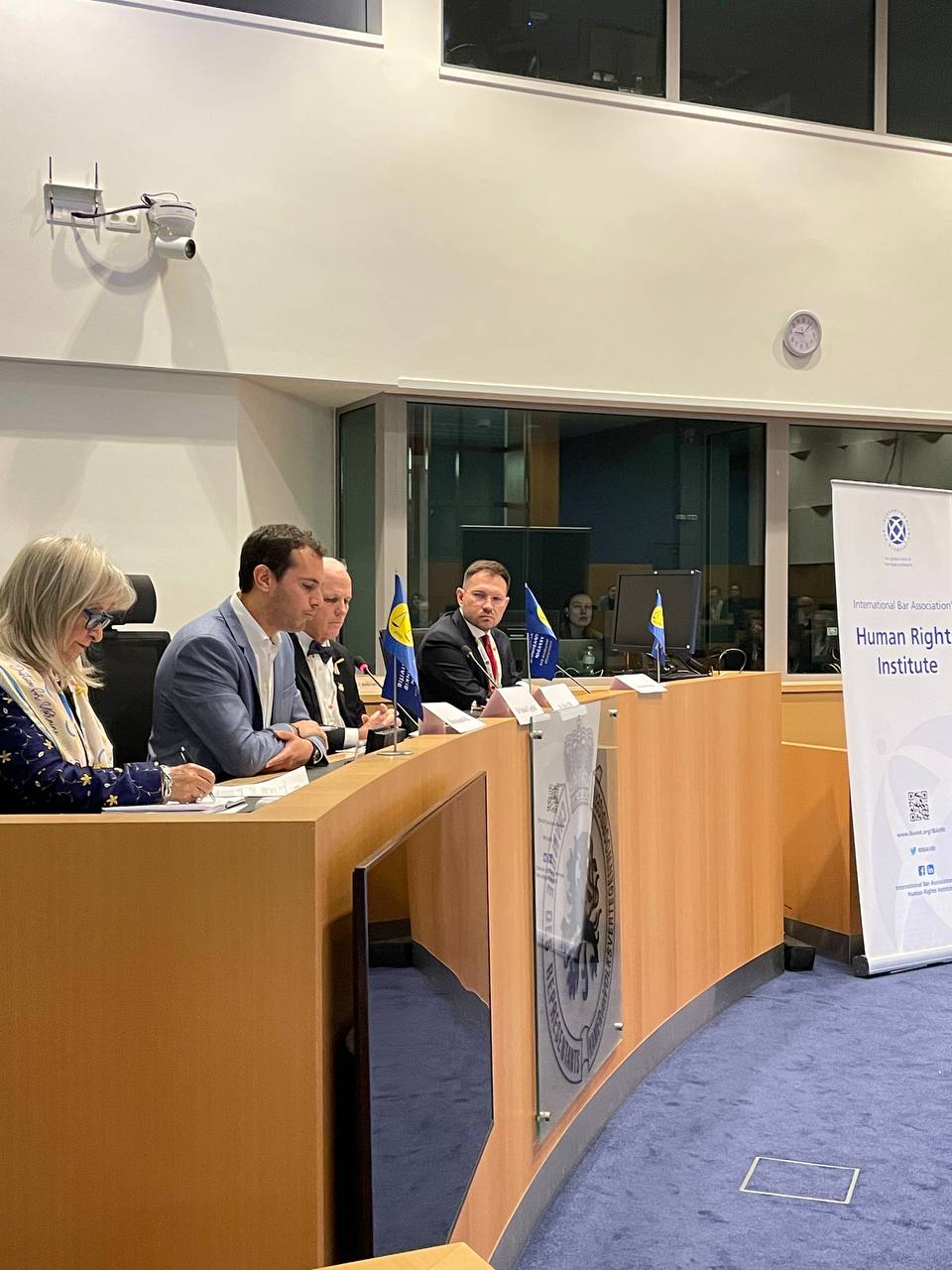
The conference was opened by Mykola Stetsenko, President of the UBA, Dr. Mark Ellis, Executive Director of the IBA, and Baroness Helena Kennedy KC, Director of IBAHRI.
The first session of the event was titled "Collecting and Preserving Evidence of Russia's Crimes in Ukraine: Progress Made and Challenges Ahead". Baroness Helena Kennedy KC and Mykola Stetsenko moderated the panel discussion.
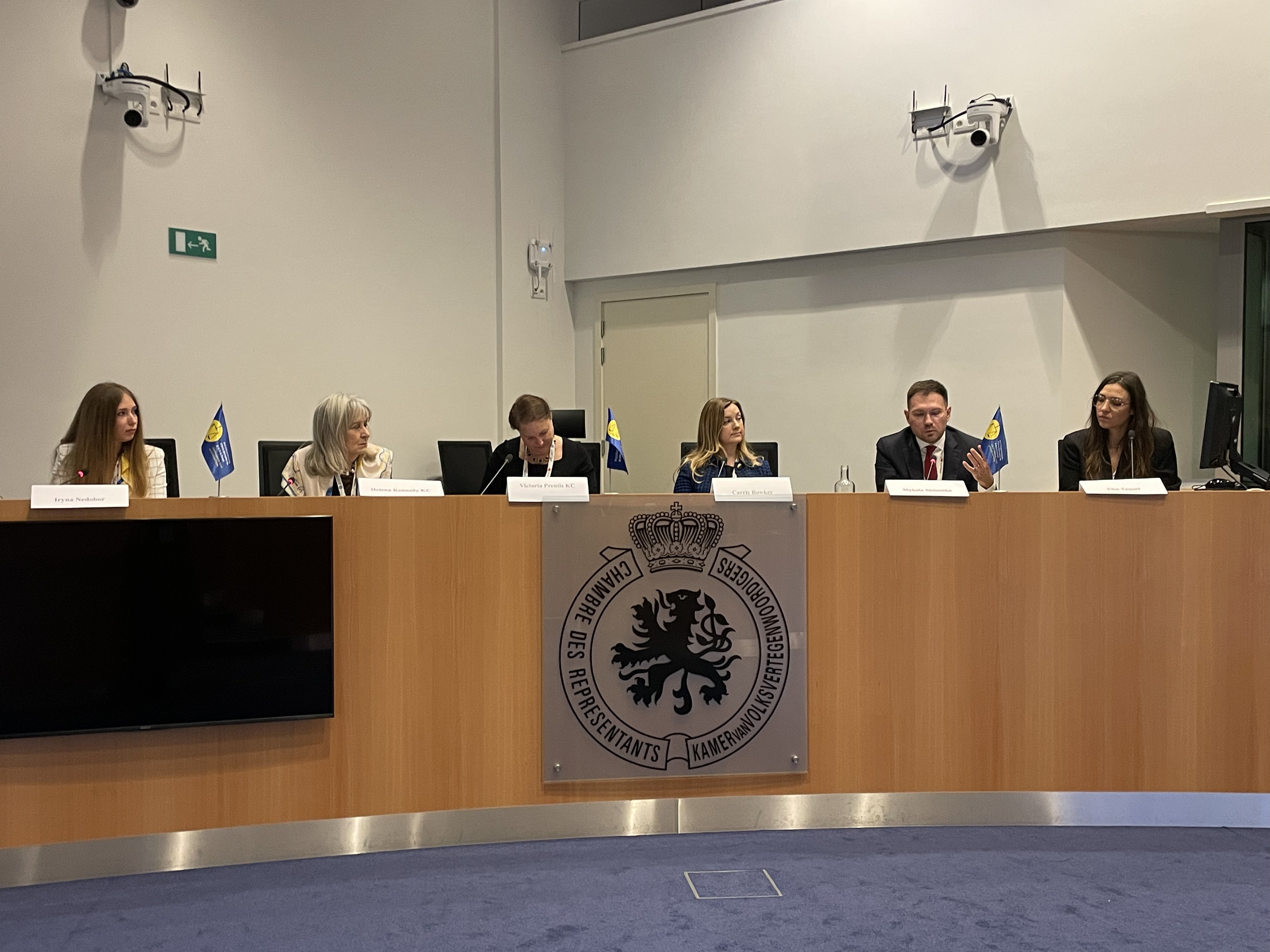
The speakers discussed the steps taken by states, international bodies and civil society organizations to document the crimes committed by Russia in Ukraine. They also discussed best practices, challenges and recommendations for further action.
The discussion was joined by:
- The Rt Hon Victoria Prentis KC MP, Attorney General, UK;
- Iryna Nedobor, Deputy Head of Office to the Minister of Foreign Affairs of Ukraine;
- Carrie Bowker, eyeWitness for Atrocities, Director;
- Elsa Taquet, Trial International, Senior Legal Advisor;
- Azeem Ibrahim, Newline Institute, Senior Director (video).
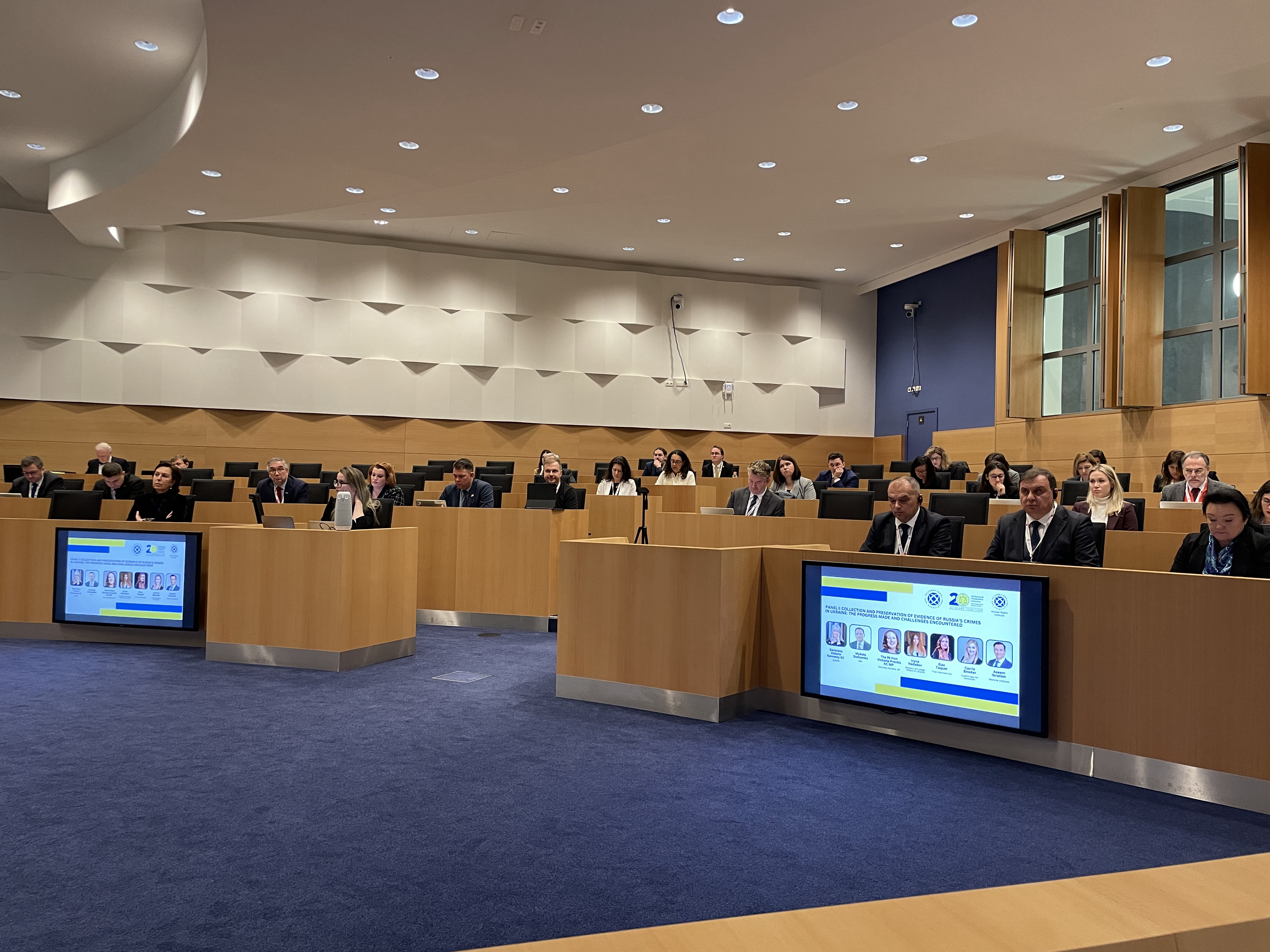
Azeem Ibrahim said in a video message that he had come to Ukraine at the invitation of the Ukrainian side to find out whether Russia was violating the Convention on the Prevention and Punishment of the Crime of Genocide in our country. Mr. Ibrahim visited the front line, talked to witnesses and collected evidence. Three expert groups analyzed the materials he collected and concluded that the Russian Federation violated the Convention on the Prevention and Punishment of the Crime of Genocide and is responsible as a state for incitement to this crime, and the handwriting of the atrocities indicates an intention to destroy Ukrainians as a national group, which is a violation of Article 3(c) of the Convention on the Prevention and Punishment of the Crime of Genocide.
The topic of the second panel discussion was "Ukrainian Justice in War Crimes Cases: Achievements, Challenges and Opportunities for Improvement". The session was moderated by Kasia Madera, BBC journalist, and Emily Foale, IBAHRI Project Manager.
The discussion focused on Ukraine's efforts to investigate and prosecute crimes committed by Russia. The participants discussed the legal and procedural aspects of war crimes trials.
The speakers of the session were:
- Dr Mark Ellis, IBA, Executive Director;
- Stanislav Kravchenko, Supreme Court of Ukraine, President;
- Oleksandr Baranov, Legal Aid Coordination Centre, Acting Head (PRESENTATION);
- Oleksandra Matviichuk, Center for Civil Liberties, Head;
- Yevheniia Bondarenko, EU Pravo-Justice Project in Ukraine, Expert.
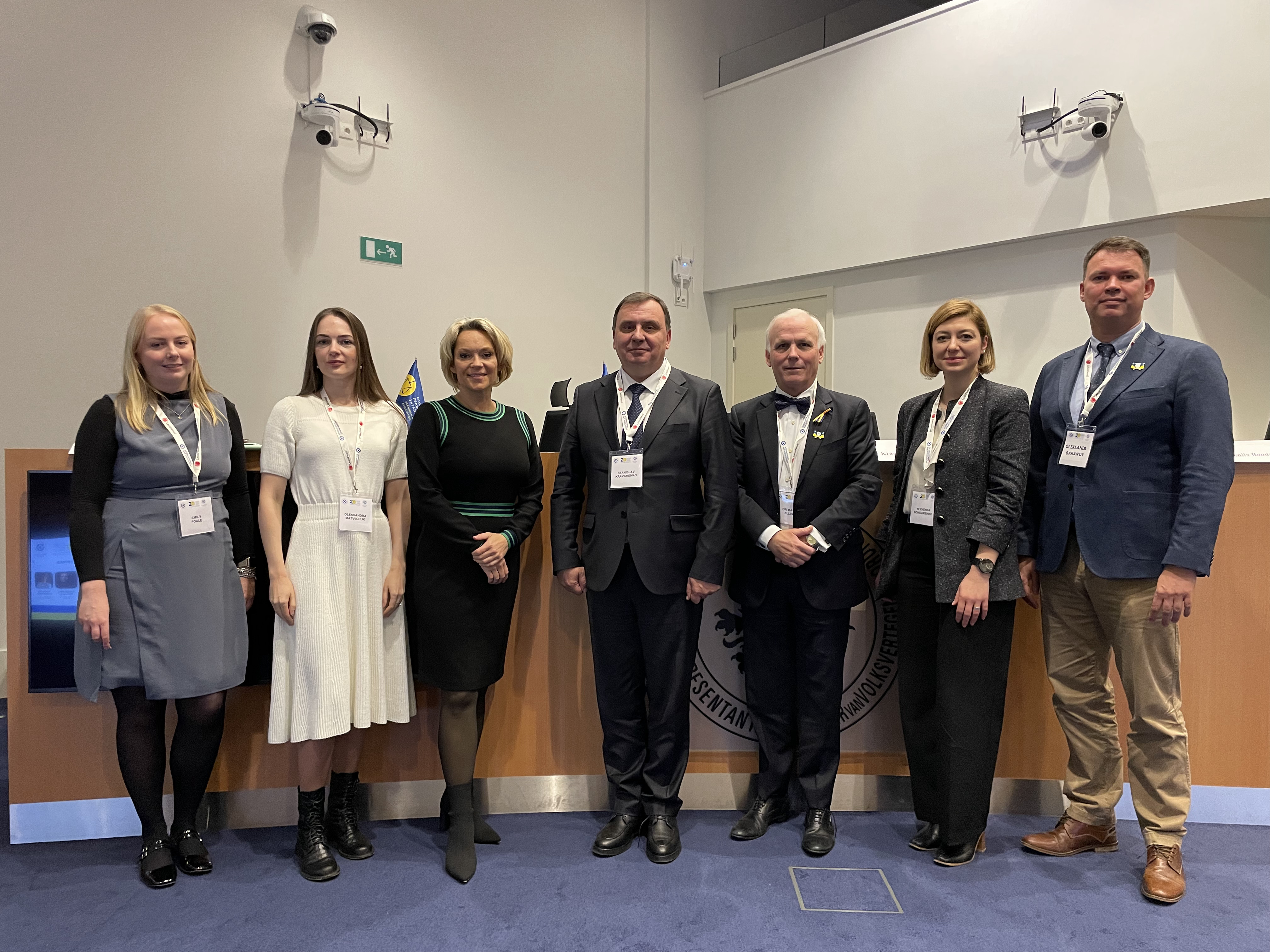
In particular, Stanislav Kravchenko presented statistics on the current state of the Ukrainian justice system and its consideration of cases related to the Russian aggression. He said that since the beginning of the full-scale Russian invasion, 135 courts (17%) have changed their territorial jurisdiction due to the impossibility of administering justice during the war. Of these courts, 43% (59 courts) have already restored their previous jurisdiction.
Mr. Kravchenko added that the judicial system currently lacks 2,227 judges, 226 judges were dismissed from January to September 2023, and a competition to fill 560 vacant positions in local general courts was announced (PRESENTATION).
According to the President of the Supreme Court, 16,000 proceedings have been registered as of today on crimes against the national security of Ukraine (5,933 have been referred to court), and more than 113,000 on war crimes (1,499 have been referred to court).
Stanislav Kravchenko noted that typical cases investigated under Article 438 of the Criminal Code of Ukraine "Violation of the Laws and Customs of War" are:
- intentional killing of civilians;
- cruel treatment of civilians;
- looting, destruction of property;
- destruction of civilian/critical infrastructure, residential buildings;
- attack on a civilian object, unlawful deprivation of liberty of civilians;
- orders to violate the laws and customs of war.
"The Special Tribunal for the Crime of Aggression — One Step Forward, Two Steps Back?" was the topic of the third session moderated by Irina Paliashvili, Member of the Ukrainian Bar Association, Managing Partner of Ukrainian Legal Group, and Ewelina Ochab, Program Associate at IBAHRI.
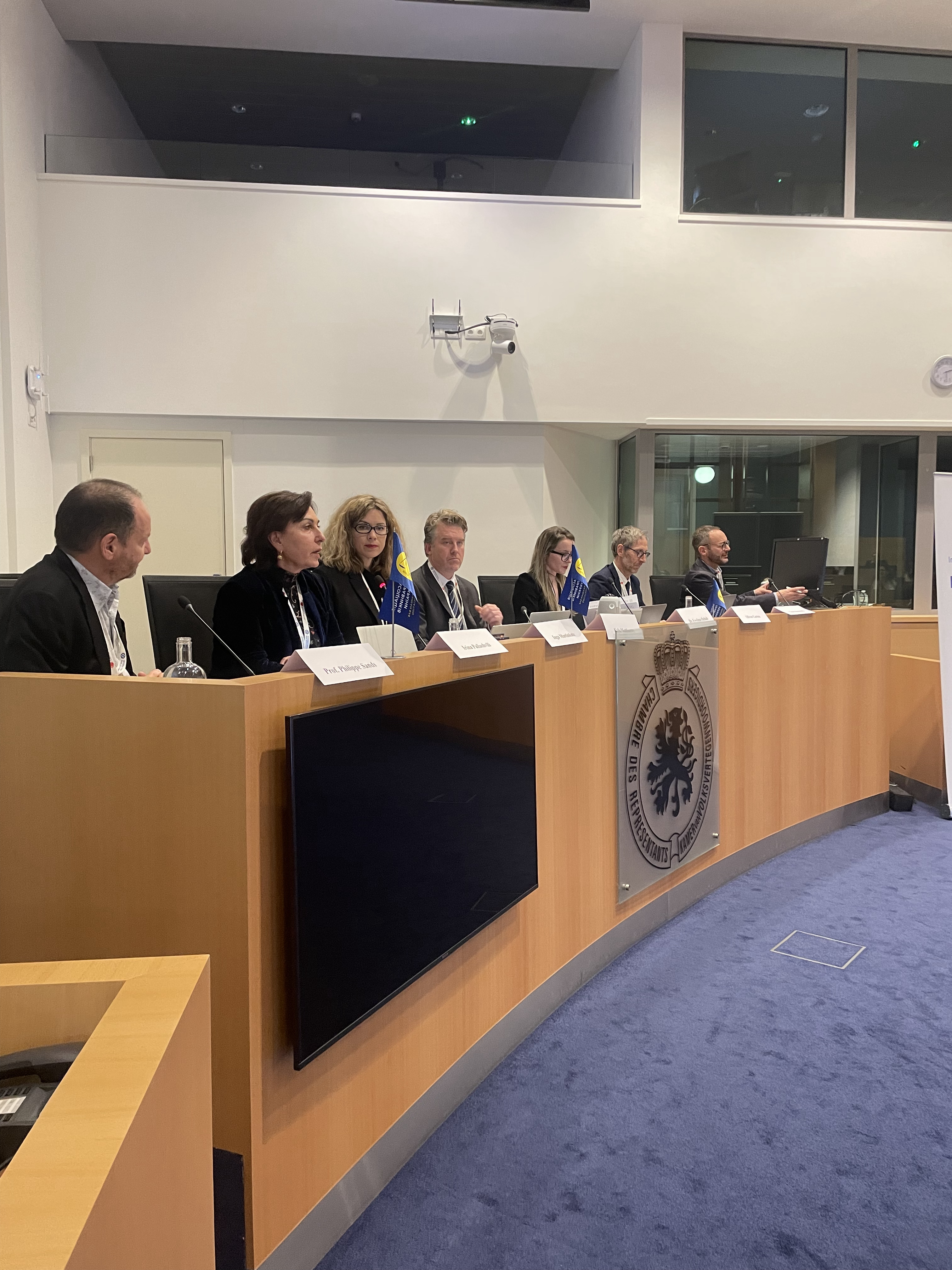
The panelists focused on the initiatives to establish a Special Tribunal for the crime of aggression against Ukraine, the progress made in this regard, challenges and chances for the tribunal to become a reality.
The speakers of the session were:
- Prof. Philippe Sands, Centre on International Courts and Tribunals at University College London, Director, Professor;
- Anton Korynevych, Government Representative of Ukraine at the International Court of Justice (video);
- Inga Martinkute, European Society of International Law, Board Member;
- Olivier Corten and Vaios Koutroulis, Université Libre de Bruxelles;
- Kyle Matthews, Montreal Institute for Genocide Studies, Executive Director.
In his video address, Anton Korynevych emphasized that Russia has been cynically abusing the Convention on the Prevention and Punishment of the Crime of Genocide since 2014 to justify its full-scale aggression against Ukraine.
"Russia is waging a war against my country in the name of the monstrous lie that Ukraine is committing genocide against its own people. For Russia, the lie is a pretext for aggression and conquest. Russia has not provided any credible evidence — and cannot provide any. In fact, Russia has turned the Convention on the Prevention of Genocide on its head. The international community adopted this Convention to protect. Russia invokes the Convention to destroy," said Mr. Korynevych.
He reminded that in December 2023, the world will celebrate the 75th anniversary of the Convention on the Prevention and Punishment of the Crime of Genocide.
"This can be an opportunity for the international community to reaffirm its commitment to the civilizational and humanitarian goals of the Convention. But if Russia's abuses remain unanswered, this anniversary will be a dark one," Anton Korynevych noted.
The fourth and final session of the first day of the conference was entitled " Putting Victims and Survivors First — Protection, Assistance, Reparations". It was moderated by Ivan Horodyskyy, Vice President of the UBA, and Dr.Samuel Cogolati, Member of the Belgian House of Representatives.
This panel discussion focused on the topic of victims, survivors and witnesses, which is often underreported, and how to ensure that the rights of these individuals are protected and their needs are met.
The discussion was joined by:
- Olga Butkevych, Ukrainian Association of International Law, President;
- Bill Browder, The Global Magnitsky Justice Campaign, Founder and Lead;
- Markiyan Kliuchkovskyi, International Register of Damage Caused by the Aggression of the Russian Federation against Ukraine, Executive Director;
- Svitlana Romanova, Metinvest Holding, Chief Legal Officer;
- Roman Vashchuk, Business Ombudsman in Ukraine;
- Maksym Popov, Adviser to Prosecutor General of Ukraine.
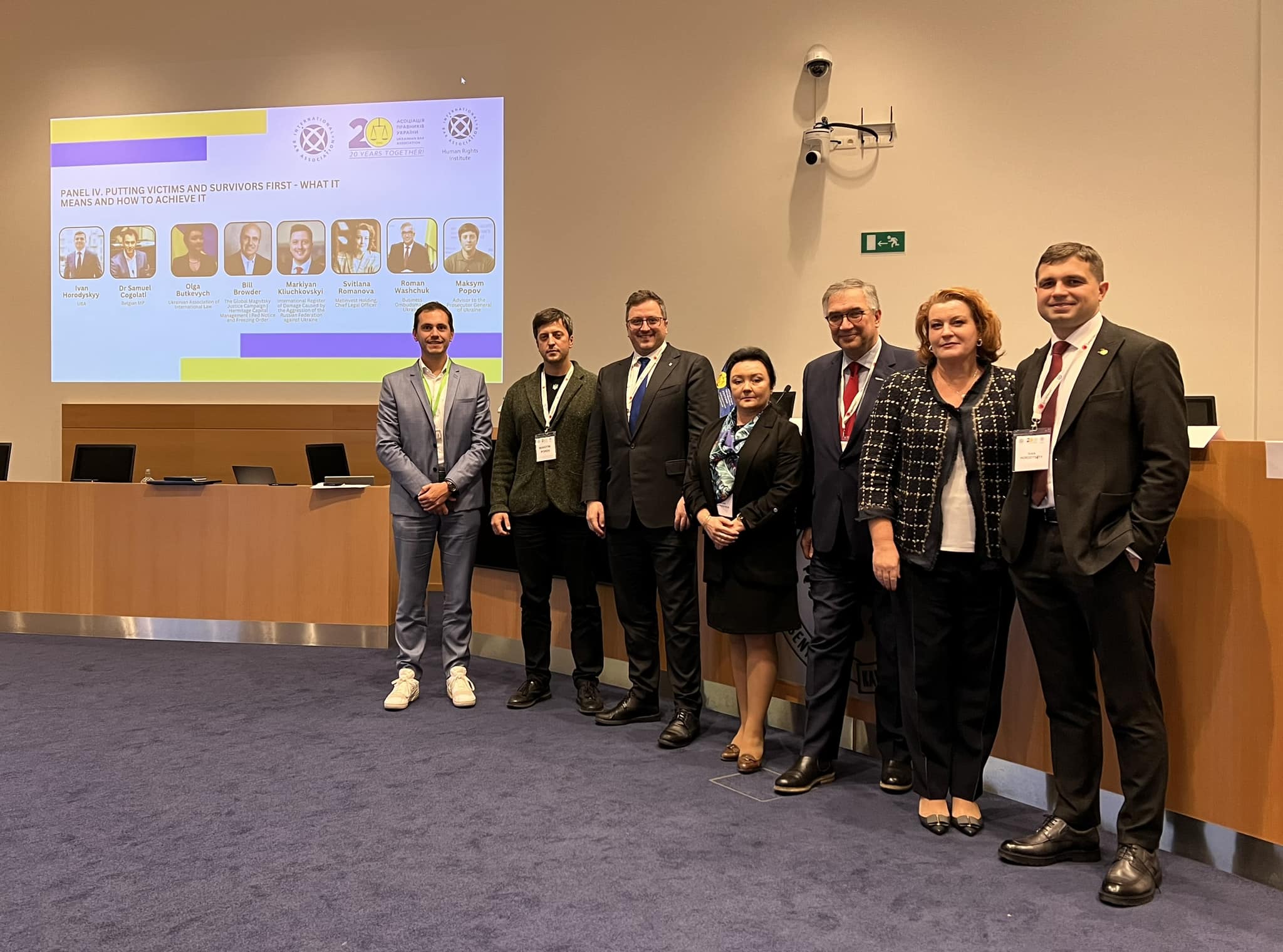
Svitlana Romanova noted that the scale of losses suffered by Ukraine as a result of Russian armed aggression necessitates the adoption of comprehensive solutions as soon as possible. At the same time, she emphasized that any decision should not only be effective, but also as efficient as possible in terms of both resources and time spent. Achieving such a balanced result in solving the problem of justice and ensuring justice for all victims of this war requires maximum efforts, Ms. Romanova emphasized.
On the second day of the conference "Justice and Accountability for the War in Ukraine", which was dedicated to summarizing the results, the participants gathered at the European Parliament at the invitation of MEPs Anna Fotyga, David Lega and Viola von Cramon-Taubadel.
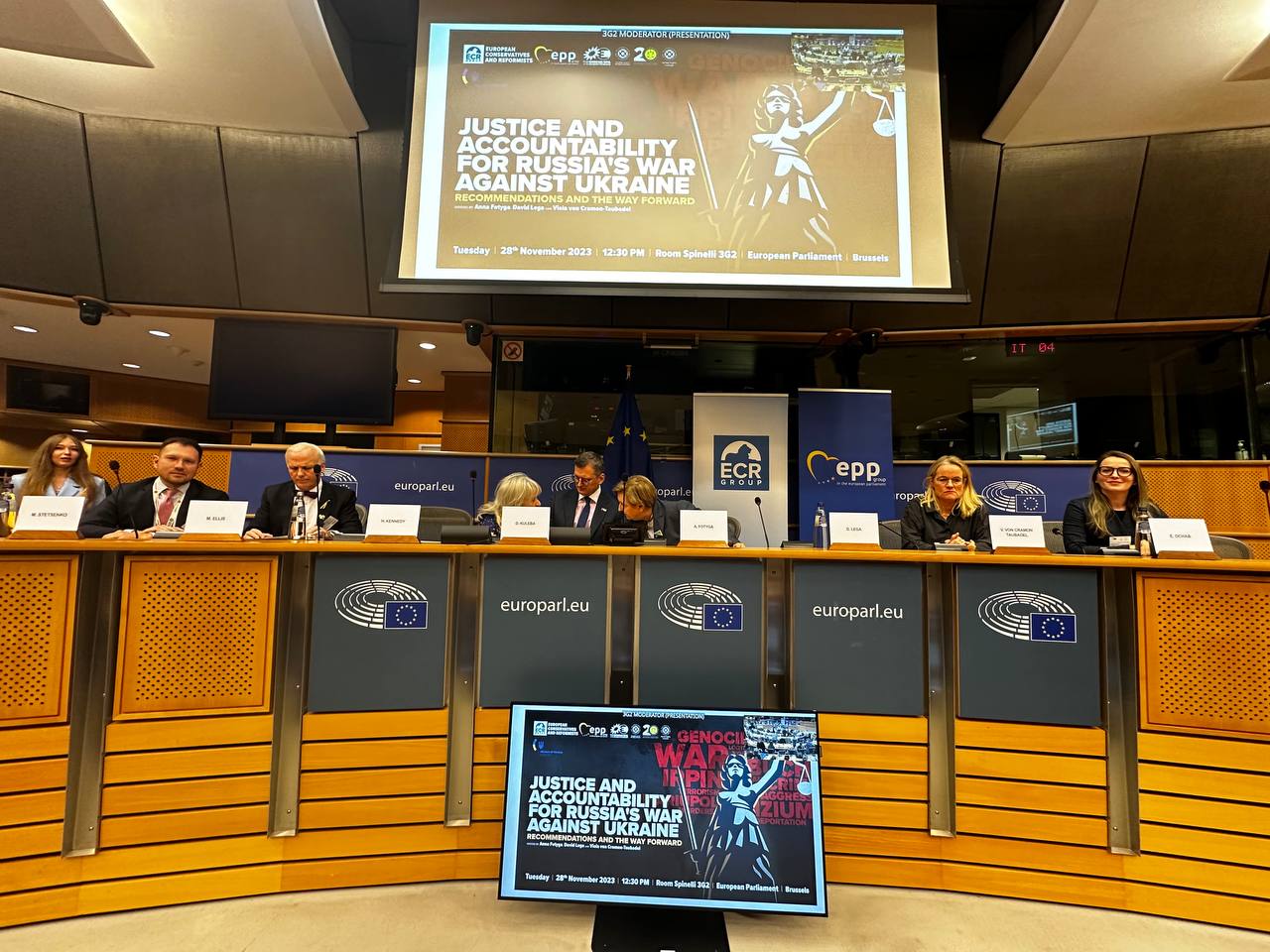
Dmytro Kuleba, Minister for Foreign Affairs of Ukraine, was one of the key speakers of the discussion. He emphasized that one of the main reasons for the continuation of Russian aggression against Ukraine is Vladimir Putin's hope that a war of attrition or a frozen conflict will allow Russia and its leadership to avoid responsibility for their crimes.
"We have already seen how quickly wars can break out. Unfortunately, there are many forces in the world that believe in war as an effective way to achieve their goals. If these forces see that Russian aggression has led to some troubles for Moscow, but in general has allowed it to achieve the goals of this aggression, then nothing will prevent them from repeating Russian actions in other parts of the world," emphasized Mr. Kuleba.
The Minister thanked the European Parliament and its members for their firm and principled position on the need to punish Russia, and the representatives of the Ukrainian Bar Association and the IBA for their efforts to support the establishment of the Special Tribunal. Dmytro Kuleba noted that the tribunal will also help to achieve justice in memory of the fallen Ukrainian defenders.
Stanislav Kravchenko, President of the Supreme Court of Ukraine, spoke about how Ukraine's judicial system functions during martial law. He noted that although in 2022 Ukrainian courts considered 30% fewer cases than before the full-scale war, this figure has now actually returned to the pre-war level. At the same time, the increase in the number of criminal cases has increased the workload of the courts of general jurisdiction, Mr. Kravchenko added.
He said that, in addition to proceedings on war crimes, high treason, and collaboration, Ukrainian courts are considering many corruption cases, as well as proceedings on violations of the order of military service. The full-scale war has led to an increase in the number of cases in other judicial jurisdictions: in particular, these are issues of compensation for damage caused by the hostilities, issues of internally displaced persons and persons outside Ukraine.
Stanislav Kravchenko emphasized that Ukrainian courts are currently facing a number of other problems besides workload: staff shortages, lack of funding, destruction or damage to court buildings as a result of hostilities, etc.
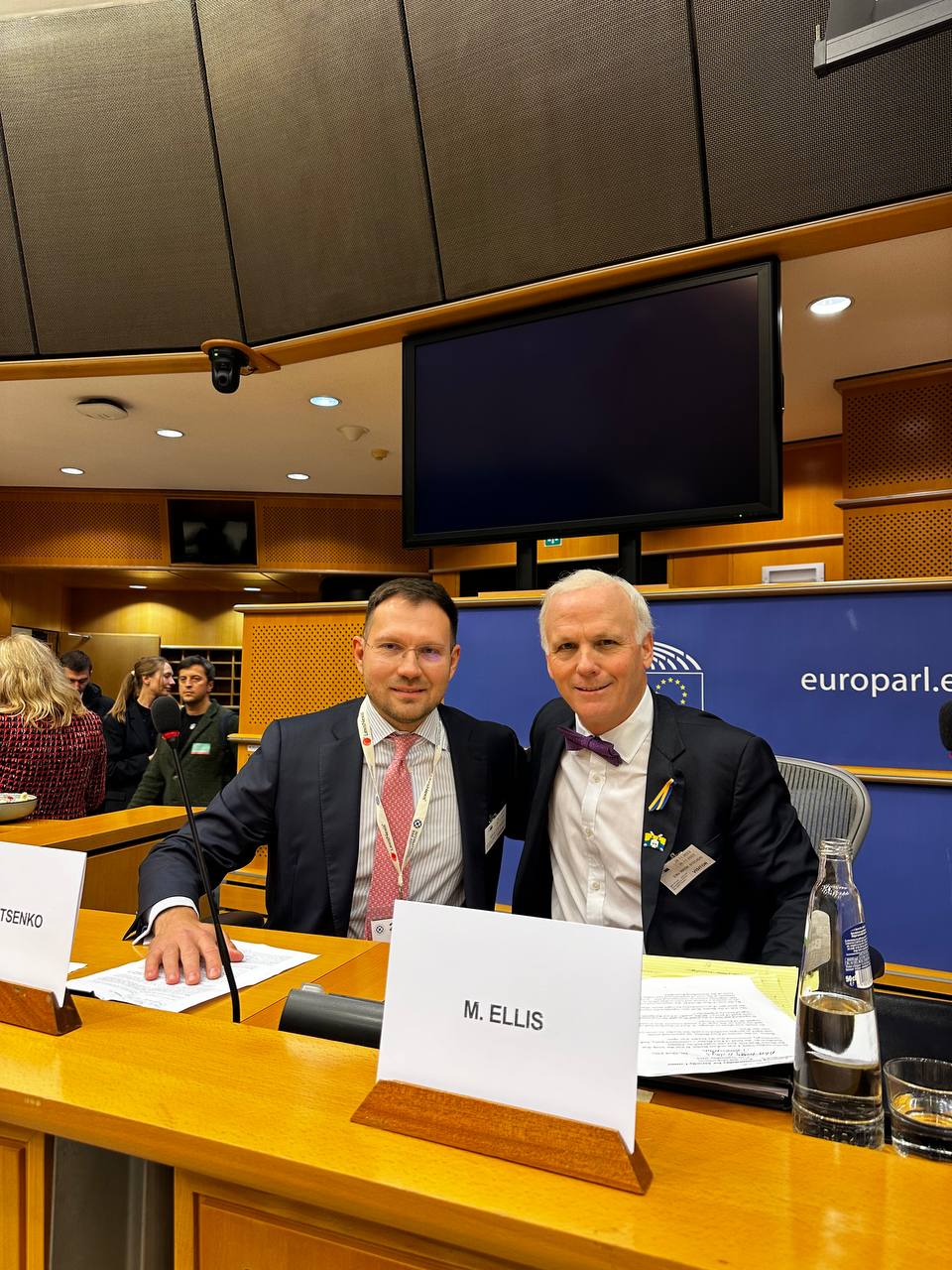
Mykola Stetsenko, President of the Ukrainian Bar Association, spoke about the joint achievements and developments of the UBA, IBA and IBAHRI during the full-scale war. In particular, these are:
- launching the Hotline for free legal assistance to citizens and businesses on the second day of the invasion;
- jointly drafting an IBA resolution to support the establishment of a Special Tribunal for the Crime of Aggression;
- the trial monitoring in war crimes cases, which the UBA carried out with the expert support of the IBA and IBAHRI;
- collecting evidence of war crimes (using the IBA's eyeWitness to Atrocities application) and developing mechanisms for accountability and compensation.
"These key themes remain at the forefront of our work and have far-reaching implications beyond the war in Ukraine. As we all watch events unfold in different parts of the world, we are reminded once again of the importance of justice and accountability. Let us combine our experience, intelligence and passion to achieve results," summarized Mr. Stetsenko.
The second day of the conference also included the opening of the virtual exhibition Living the War.
